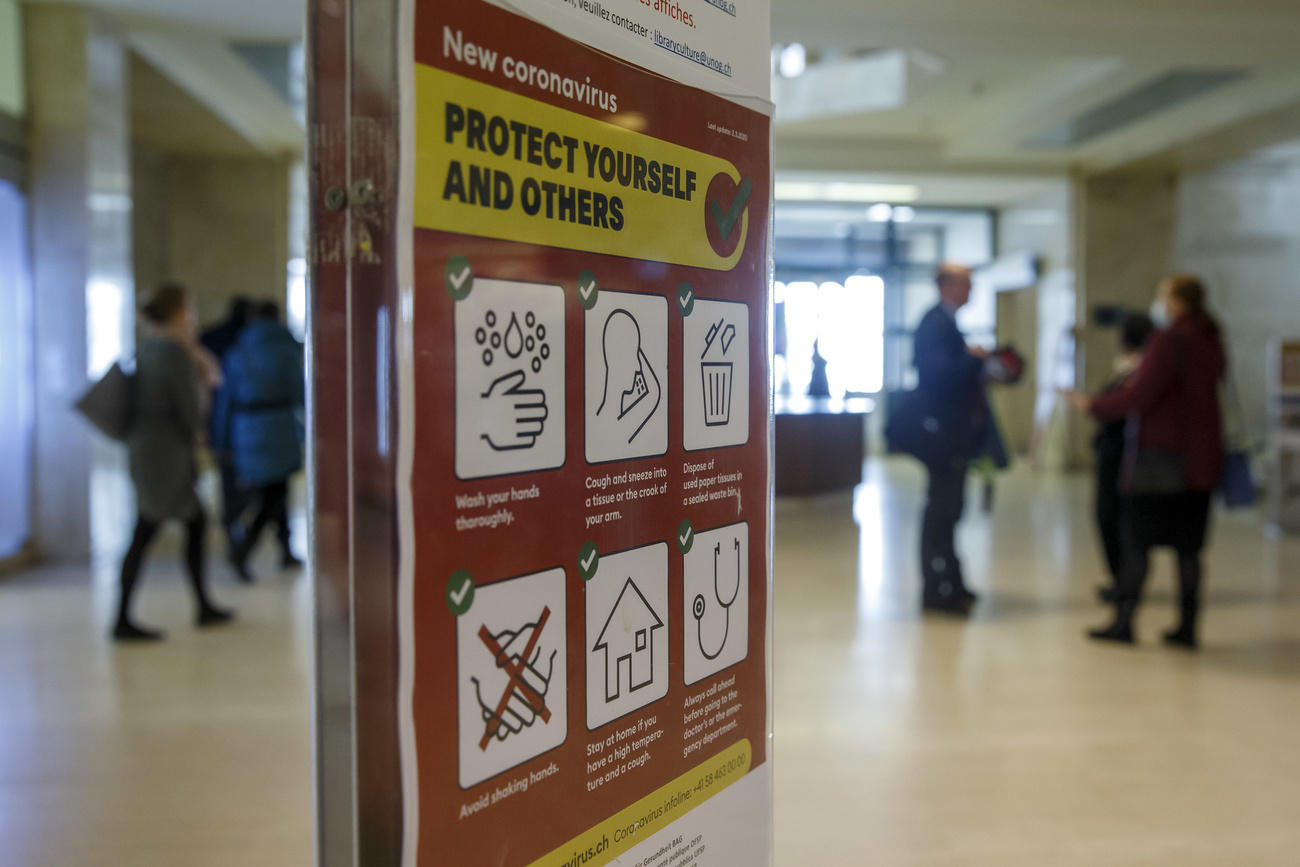Diplomacy goes virtual as the coronavirus goes viral
The spread of the new coronavirus is testing our globalised world, writes Jovan Kurbalija, executive director of DiploFoundation External linkand head of the Geneva Internet PlatformExternal link.
Countries are looking at one another with suspicion, once bustling public spaces seem emptier, and many people and organisations are avoiding travel. The world of diplomacy is particularly affected by these developments, as meetings, conferences, and other major events are cancelled.
International cooperation is essential in times of crisis
However, diplomacy cannot stop: international cooperation is essential in times of crisis. Driven by necessity, diplomacy is adapting. For the first time, the World Bank and the International Monetary Fund (IMF) will host their Spring Meetings onlineExternal link. The United Nations, European Union and other organisations are moving from conference rooms to online spaces, triggering a profound change in the way diplomacy is conducted.
While the public health crisis is accelerating this shift, diplomacy supported by electronic tools (‘e-diplomacy’) is not new. Since 2006, the Internet Governance ForumExternal link – the world’s preeminent Internet policy forum – has combined face-to-face and online participation. Back in 2010, the eruption of Icelandic volcano Eyjafjallajökull disrupted air travel worldwide and triggered a massive increase in the use of tele-conferencing tools.
More recently, climate change activist Greta Thunberg put a spotlight on business travel by sailing across the Atlantic to New York, and then by taking the train to the climate conference (COP25) in Madrid. The world took note. On the last day of the climate conference, the Swiss government pledged to reduce official air travel by 30% by 2030.
The accelerated transition towards online meetings and diplomacy faces three major challenges. The first relates to the technology itself. There have been innumerable breakthroughs in communications technology, yet it still often fails us. Despite all the latest technological developments, online platforms are not yet stable enough nor intuitive enough for seamless meetings.
“Can you hear me?”
The online experience is usually characterised by repetitive exchanges of ‘Can you hear me?’ or reminders to (un)mute the microphone. These problems may seem trivial, but they can hamper the momentum of a meeting. This has discouraged both individuals and organisations from relying on online conferencing. There is a clear need for smarter platforms that account for human imperfections and create better user experiences.
Furthermore, even to this date, basic access to the Internet remains a serious challenge in many developing countries, which are already marginalised in traditional diplomacy. Reliable access must be ensured in these places in order to avoid digital and diplomatic divides reinforcing each other.
The fundamental dynamics of human interaction and attention are the second area of concern. Online meetings bring forth new social dynamics compared to traditional meetings. The rich, human context that shapes a face-to-face meeting is often absent in a virtual setting. Body language and overall ‘personal chemistry’ are minimised or lost entirely. Establishing a presence in meetings, or simply keeping the attention of participants, can be incredibly difficult. When more interesting and engaging content is readily accessible, running an effective meeting is almost impossible. As diplomacy and other fields steer towards the online space, it is clear that we need engaging meeting platforms and techniques beyond the existing ‘talking heads’ format.
Protocol
Finally we have an issue of particular importance in diplomacy: protocol. Online meetings challenge centuries-old rules of protocol shaped by hierarchy and fixed rituals. Online exchanges have proven to be more informal and less ‘protocol friendly’. While the loss of some aspects of diplomatic tradition would not be regretted, some rules of engagement must remain. Protocol and rituals protect diplomats’ unique role as representatives of their countries, and are essential in allowing them to engage with their counterparts despite divergent and conflicting national positions and interests.
While these challenges will continue to make the art of diplomacy difficult, there is no turning back. We need to adjust and adopt the best of both worlds: a new, ‘hybrid diplomacy’ that combines face-to-face and online meetings. Highly delicate political negotiations such as the recent peace deal between the US and the Taliban demonstrate the continued necessity of gathering real people in actual rooms. But many other more technical and routine meetings can and should shift online.
Hybrid diplomacy will be concentrated around traditional face-to-face meetings, organised online participation, and ad-hoc online meetings.
Hopefully, coronavirus will pass soon. However, in its wake, we must nurture the new ideas and approaches we gain from this crisis, while effectively fusing them with our traditional practices. The way that diplomacy – and our online meeting spaces – adapts will be critical in addressing other crucial issues for humanity, from fighting climate change to ensuring peace and dealing with other global issues for years to come.
For more information on tech, behavioral and tech aspects of conference tech please visit: the Conference Tech LabExternal link and Geneva EngageExternal link .
The views expressed in this article, which was first published on the DiploFoundation websiteExternal link, are solely those of the author. They do not necessarily reflect the views of swissinfo.ch.
Opinion series
swissinfo.ch publishes op-ed articles by contributors writing on a wide range of topics – Swiss issues or those that impact Switzerland. The selection of articles presents a diversity of opinions designed to enrich the debate on the issues discussed.

In compliance with the JTI standards
More: SWI swissinfo.ch certified by the Journalism Trust Initiative













You can find an overview of ongoing debates with our journalists here . Please join us!
If you want to start a conversation about a topic raised in this article or want to report factual errors, email us at english@swissinfo.ch.